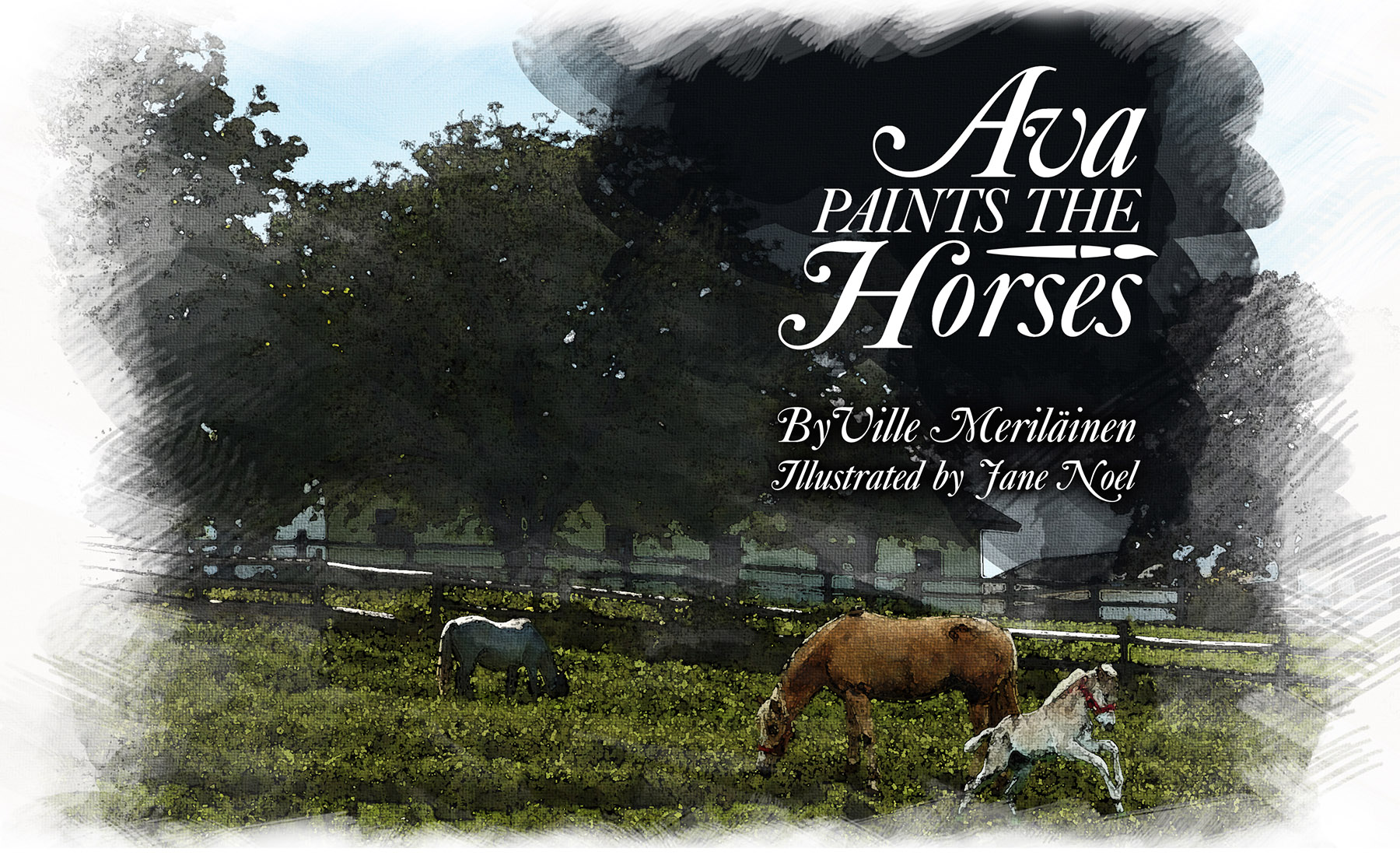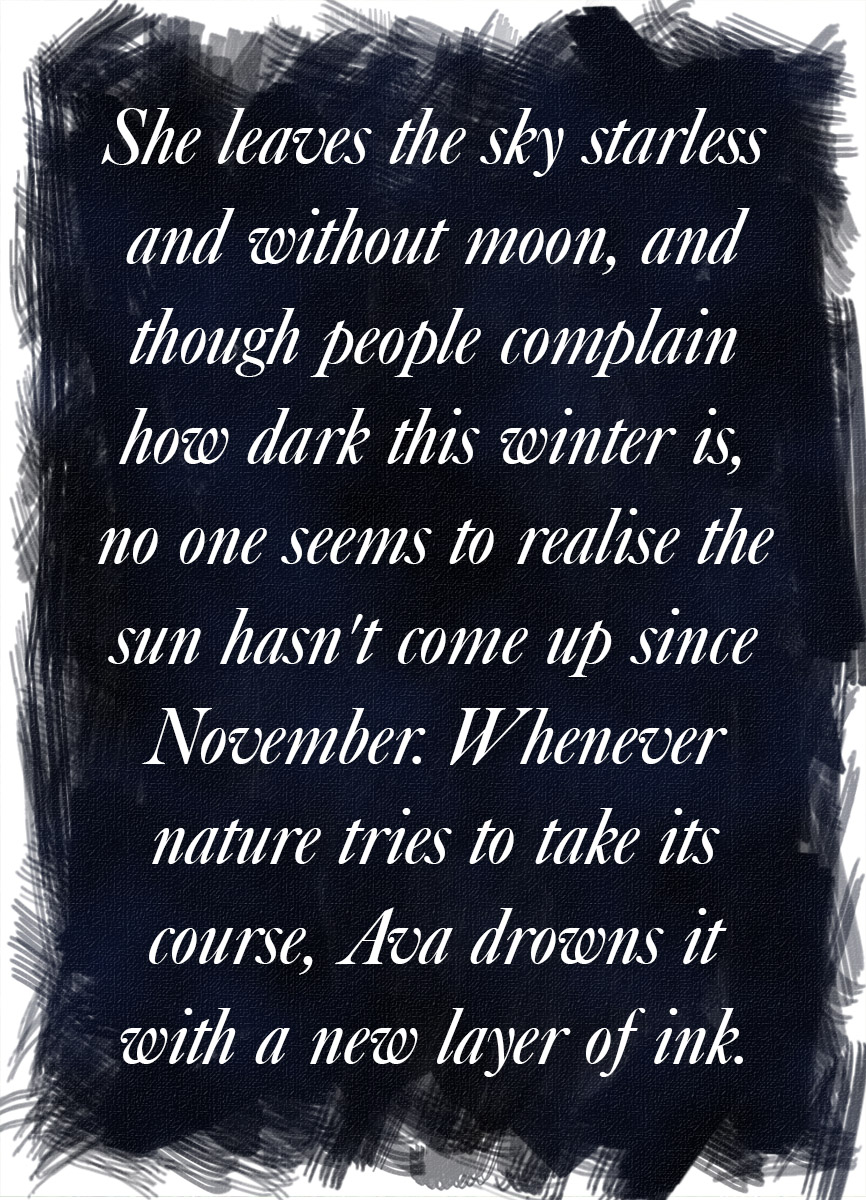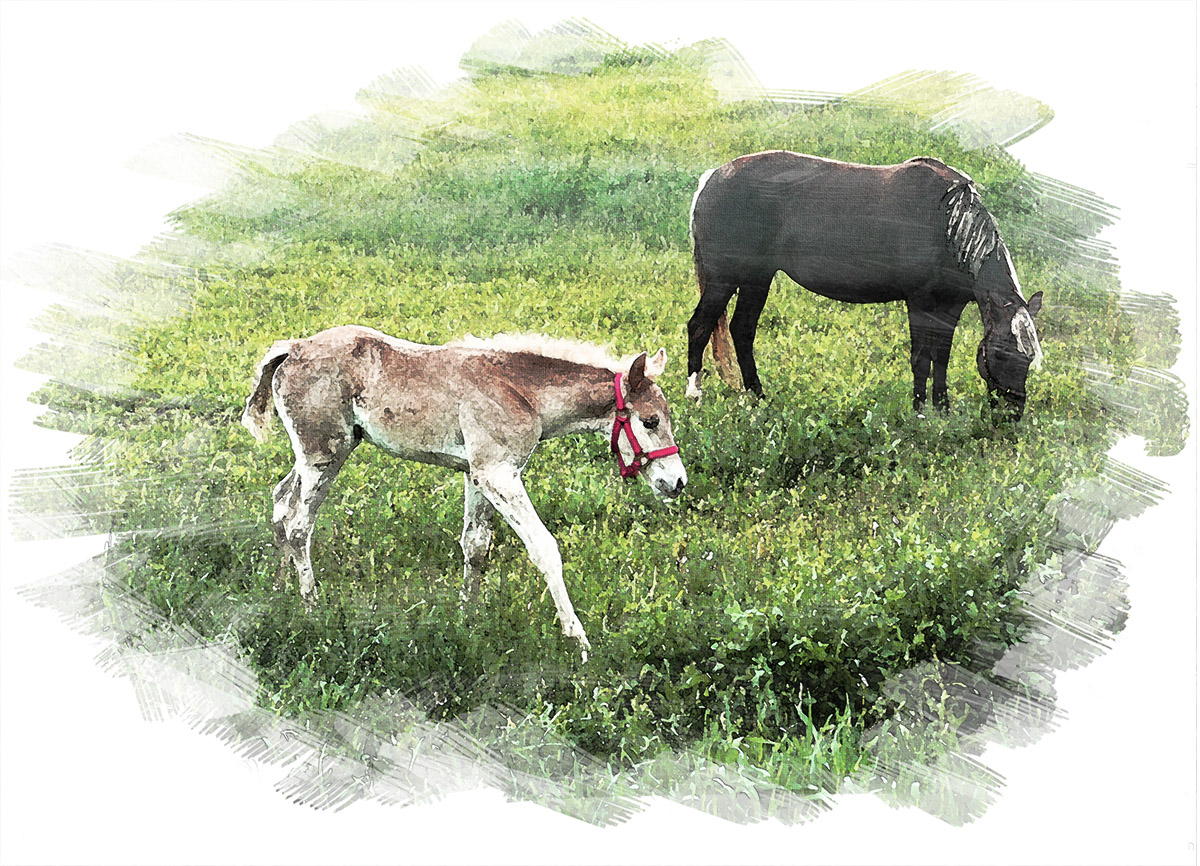
Originally presented by CastofWonders.org, where you can enjoy the tale as narrated by Karin Kania.
Ava Paints the Horses
By Ville Meriläinen
It's late into morning on a Friday, and Ava paints the horses. Her feet are bare despite the season, and she has buried them in a pile of leaves that rustles as she curls her toes in rhythm with her strokes. The scent of hot cocoa wafts up from the mug between her knees, mixing with the smell of summer grass that escapes her painting.
She sits on the porch of her home and sinks herself into her work, so she wouldn't have to hear how close Mom is to tears when her parents argue about money. It's a school day in September, but she hasn't been in class for days. Everyone is understanding of her troubles at home, but no one asks where she would rather be.
Ava paints the horses running and grazing, resting and playing, and life imitates her art. When she looks past her canvas, the foal she placed in the corner appears to take its first fumbling steps on the field down a slope from her yard. When she dabs her brush in black paint and smears it over the sun, a swath of stars spreads above her. No one ever wonders about the strange rifts in the sky, when night is so eager to fall it smothers the sun, and that suits her fine.
She paints herself in the picture too, and Mom and Dad, all together under the oak growing at the edge of the field. Her hair looks a bit too much like Mom's, darker blonde than her own, but she doesn't correct it. There are things she cannot change, and so her real braid keeps its strawberry streaks.
Once she's satisfied with her work, she blackens the rest of the sky and goes to sit under the tree. Mom and Dad don't appear with her, not until the grandfather clock in the living room tolls for what should be noon. Then, Mom steps on the porch and shouts, "Ava! What are you doing out so late? You should've been in bed hours ago."
Ava gives the sleeping horses a melancholy look before running off. Her dress is damp. Even cloth is tricked into thinking the day has passed, but she can't make her parents sit with her.
It's cold and windy on a Wednesday, and Ava paints the horses. When the first ones appear on the seaside knoll, Dad laughs a little and says they look just like the ones living near the house. Ava rolls her eyes; they are the same, the ones she carries with her. She asks him how come it's all right for a fifth-grader to miss so much school, but Dad doesn't answer. He looks out to the waves and breathes deep the salty air, and for what it's worth, sits beside Ava.
He talks, but Ava doesn't listen. He talks for the sake of talking, without answering her question and only leaving her with many more. She nods and replies with "uh huhs" and "mms," but focuses on her work. She must finish the painting and expel it from her thoughts, before it makes her mind sick.
Dad stops talking when Mom calls. They don't fight anymore, now that she's gone, but she still calls every day and still worries about money. Ava doesn't want to talk to her, but Dad takes her brush and replaces it with the phone despite her protests. Mom talks for the sake of talking, and Ava nods though Mom can't see it.
When they're done and she hands back the phone, Dad asks, "Do you miss her?"
Ava shakes her head and turns the sun into moon.
"It won't be long until you can see her," he says and starts drawing in the sand with a stick. "Sam will pick you up next week for a visit."
Ava blows on the paint to make it dry faster. "Uh huh."
"I'd take you myself, but money's a little tight with the hospital bills. I'll get it all sorted out soon. Promise."
"I don't want to see her."
She lets Dad pull her closer, and they sit like this while the sun pales into moonlight.
"She needs to see you, Ava. You don't have to stay for long, but you do have to go," he says, oblivious of the change in the sky. Ava slathers black paint around the white disc even as he talks, to end the conversation together with the day.
"I can't stand looking at her."
Stars appear on the surface of the sea and smother clouds. Dad says nothing, and Ava wonders if he talks for the sake of talking because he doesn't have answers for himself, either.
When her work is done, night falls complete and silent over the sea. "Oh, my," Dad says with a start. "How did it get so late? We should head back home."
He goes to start the car, and when he walks off, Ava picks up the canvas and throws it as far as she can. The waves pull the painting out to the sea.
"Come on, Ava," Dad shouts through the window. The headlights sweep over her as he pulls up, and Ava wipes her face and gathers her things before he sees her crying. If Mom won't let them see her tears, Ava won't either.
When they drive past the knoll, Ava watches the horses running into the sea until the waves bury them.
Sam bows his head, turns the bow into a nod and gets up. "Okay, then. Call us if anything changes. Sorry that I can't keep you company, but I need to get back to work." Once he's pulled on his shoes and coat and is halfway out the door, he says, "Oh! Almost forgot." Ava watches him hurry across the yard to his truck to pick up something from the front seat. Her throat clenches when he wades back over the drifts with a bag from the handicrafts store. "I thought I should support the artist in the family," he says with a smile, stomping his heels against the porch so he wouldn't bring snow in. "I didn't know what to get, so I got a little bit of everything." In the bag Ava finds new brushes, a stack of quality paper, water and oil colours, and a set of pencils. "Thanks," she says, but then frowns. "There's no black in here. I'm running out." "Oh." Sam scratches his neck, then laughs when he looks out to the yard. "Guess you'll have to use the pastels. Could do with a little colour in a season like this." Sam leaves and Ava returns upstairs. She drops the bag by the stool and easel, but instead of sitting down, goes to the bookshelf and searches it for the storybook from which Mom used to read her bedtime stories. Tucked between the pages is a photograph from when Mom and Dad were kids and had first met. Mom sits under the oak in the yard and reads to Sam from that very book, and she looks just like Ava even though she's a few years older. Dad sits on a low-hanging branch above them, a goofy-looking boy of twelve or thirteen, and laughs at something outside the picture. Horses fill the background, running and grazing, resting and playing. Ava looks at the picture until her hand starts to shake, then slams a fist to her thigh, again and again, until she lets herself sob for the bruise on her skin instead of those on her heart. Then she hides the photograph, shuts the book and shoves it back on the shelf. Ava pretends to be asleep when dad comes home and checks on her. Once she hears the TV turning on, she creeps out of her bed and paints all night. Pastel green turns their air poisonous; a light shade of brown leaves the earth dead and scarred; and the oak, she decides, earns the last glob of black left in the tube, so it can burn to cinders beneath her brush. When dawn breaks the pall she's laid and floods her room in gold, Ava paints the horses. On a bleak Saturday morning, Ava walks amidst the horses.
The snows have melted, but the earth is icy and stings her bare feet. Mist hides her, and she imagines the scene must look precisely like the painting in her room. She has painted herself in the picture again, and life imitates art, with a dark figure passing through a field of beasts that aren't only bone anymore, but crow-picked and rotting.
The buzz of a fly becomes a thrum when they swarm by the millions. Theirs is the sound Ava's blood made in her ears in Mom's hospital room, and she replicated it perfectly with the flick of a brush. They are as much a testimony to her skill as the stench enveloping her, not of fetid flesh, but extreme cleanliness, unfitting in the surroundings.
Under her arm she carries the storybook, and tucked between the pages is the photograph, though now it's ripped halfway. When Ava comes to the burnt oak, she takes out the photo and sits the way Mom does, with the book open on her lap. Ava doesn't have a brother to read to, so she reads to herself, sick with the taste in the air creeping onto her tongue every time she opens her mouth. She braves it to imprint the scene in the photograph into her own life, so that it will never fade. There are things Ava cannot change, and no matter how hale she painted Mom, no matter how happy she made Mom look sitting under the tree, every time Ava visited her in the hospital she had lost more of herself, until she couldn't tell who the girl in the photo was supposed to be.
Dad finds her when night comes, long after Ava's stopped crying and sits in the cold watching stars. He doesn't tell her to run inside, but comes with a blanket and a thermos full of hot cocoa. They sit together, and Dad pays no mind to the scenery of loss around them with which Ava has poisoned herself. She sips the cocoa, careful not to burn her tongue, and lets Dad pull her closer.
"She lived here all her life, you know," he says when he notices the photograph sticking out of the book. "I used to work in town for the summers, but we didn't see each other much until I decided to move here for her." He laughs. "If I'd have worked in your grandpa's firm, we'd never have had half these troubles. Proud man, and still too bitter over my leaving to help out his only son after all this time."
"Did you ever regret it?"
"Not for a second."
When she's sure she can keep her voice from cracking, Ava says, "I should've been there for her. More than I was."
"You were there when you could, and she knew that."
Ava sets her gaze on the book and mutters, "I don't think that's true."
"I do. It was hard for me to see her the way she'd gone, and I can't imagine what it must've been like for you."
"It wasn't that," Ava says, and won't look up even when Dad turns to her. She tucks up her knees and presses her chin hard against them. "I was so scared for her, but Mom seemed happy, like she didn't care she was going to forget us."
"Oh, Ava. That's not it at all."
She wipes her face and groans to keep herself from crying. "Then what?"
"She was scared too, but in the end consoled me instead of the other way around. I think she figured out there was nothing we could do for her, so she thought we'd hurt less if she was brave."
"Well, it hardly worked," Ava says sourly, and it makes Dad laugh a little.
"But the intention was good. Maybe it made it easier for her to accept what was coming when she thought she was making it easier for us as well."
Despite herself, Ava sniffles, and Dad pats her shoulder until she says, "I miss her."
Dad leans back against the burnt bark and looks up to the sky. "Yeah, I do too." After a while he brushes his nose and gets up. "Let's get you to bed. Too cold to sit around outside."
As they head back to the house, Ava says, "Sam asked if I wanted to stay with him and Aunt Heather for a bit."
"Oh? Would you?"
She ponders a while, nods.
"That's nice of them. I hate having you alone around the house all day. I'll call him tomorrow." He reaches out a hand, and Ava takes it. "It'll be a while before I've paid off the hospital bills, but when I have, we'll go someplace together. Just the two of us."
Ava puts on a smile for him. "I'd like that."
Once Dad has kissed her goodnight, Ava waits until she hears snoring from the other room and gets up. The painting by the window is her last, weeks old now, and even with the window closed she can smell the field outside. Despite all her efforts to exhale the fetor of mortality from her memories, the cloud kept its odour of disinfectant and rubbing alcohol.
Now, when she closes her eyes and breathes in deep, she summons up the scent of Mom's hair in her pillow.
Too tired to paint, Ava empties a tube of white paint onto her hand and smears the tainted canvas with it.
|
 |
DreamForge Anvil © 2021 DreamForge Press
Ava Paints the Horses © 2021 Ville Meriläinen

